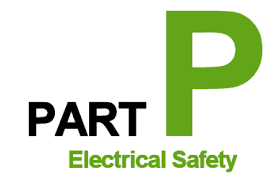
What is Part P of the Building Regulations?
Since 2005, all electrical work in dwellings in England and Wales, whether carried out professionally or as DIY, must meet the requirements of Part P of the Building Regulations.
Part P is in place to keep you and your family as safe as possible from electrical hazards, and applies to new domestic properties, as well as any alterations or additions to electrical installations in existing properties, including full or partial rewires.
Who is responsible for making sure that electrical work in your home meets the requirements of Part P?
By law, the homeowner or landlord must be able to prove that all electrical installation work on their property meets the requirements of Part P, or they will be committing a criminal offence.
Local Authorities have the power to make homeowners or landlords remove or alter any work that does not meet the requirements of the Building Regulations.
What electrical work is notifiable in England?
Electrical work which requires notification differs between England and Wales. Additional changes were introduced to Part P in England in April 2013. This means that electrical work in a dwelling, or associated with its surroundings, is notifiable to a local building control body where it includes:
- circuit alteration or addition in a special location - (Certain zones within a room containing a bath or shower, or a room containing a swimming pool or sauna heater.)
- installation of one or more new circuits
- installation of a replacement consumer unit (fuse box)
- rewire of all circuits
- partial rewire
- new full electrical installation (new build)
What electrical work is notifiable in Wales?
The following are examples of electrical installation work in a dwelling, or associated with its surroundings, that is notifiable to a Local Authority Building Control in Wales:
In general:
- a complete new installation or rewire; or
- the replacement of a consumer unit (fusebox); or
-
the installation of:
- a new circuit, whether at low voltage (typically 230 V) or extra-low voltage);
- a solar photovoltaic power supply;
- electric ceiling or floor heating;
- an electrical generator;
- power / control wiring for a central heating system
In a special location*, the installation of:
- wiring/equipment for telephone or extra-low voltage communications, information technology, control or similar purposes
- a prefabricated equipment set and any associated leads with integral plug and socket connections (for example lighting)
In a kitchen** or special location:
- extension of an existing circuit within a kitchen or special location
Outside of the dwelling, the installation of:
- a supply to a detached garage, shed or other outbuilding
- a supply to an electric gate or pond pump
- garden lighting
- a socket-outlet
* A special location is a room containing a bath or shower, swimming pool or a sauna heater
** For Building Regulations purposes, a kitchen is a room or part of a room which contains a sink and food preparation facilities

